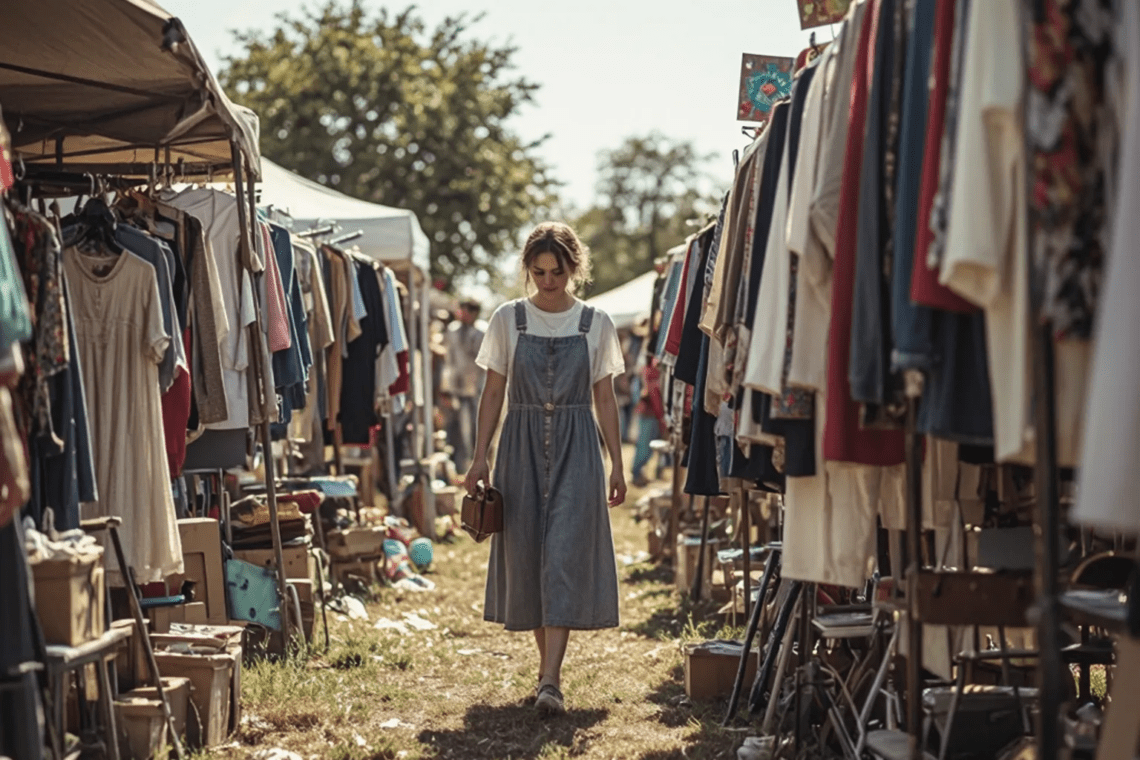
Natalie Palmer didn’t consider herself a superstitious person. At 22, she was grounded, practical, and a little too enamored with vintage fashion for her own good. So, when she stumbled upon an estate sale in a crumbling Victorian house on the edge of town, she couldn’t resist stopping.
The air inside was thick with age, the kind that carried a faint smell of mothballs and regret. An ancient man named Titus sat hunched in a corner, his skeletal fingers trembling as he watched the few patrons sift through the relics of someone else’s life. He barely moved, his eyes sharp despite his frailty, like a crow perched on a tombstone.
Natalie wandered past stacks of old books and tarnished silverware until she saw it: the dress. It hung on a mannequin in the corner, untouched by time. Deep emerald green, with intricate beading that shimmered even in the dim light, it seemed to call to her. She ran her fingers over the fabric—it was cool, almost too cool, as if it had been plucked from a snowstorm.
There was no price tag. She hesitated before approaching Titus.
“How much for the dress?” she asked, holding her breath.
Titus’s rheumy eyes flickered to her, then to the dress. A shadow passed over his face. “Five dollars,” he croaked, his voice like dry leaves crumbling.
“Five?” she repeated, startled.
“It’s yours,” he said, a strange smile tugging at his lips.
She handed him the money, ignoring the way his bony fingers lingered as they brushed hers. She left quickly, the dress pressed to her chest like a secret.
At home, Natalie eagerly slipped into the dress. It fit as though it had been made for her, hugging her frame with a precision that felt uncanny. She stepped in front of her mirror to admire herself—and froze.
The reflection staring back wasn’t hers.
A pale woman with black hair and porcelain skin looked out from the glass. She wore the same dress, but her eyes were wide with fear, her lips trembling as if she were on the verge of speaking. Natalie staggered back, nearly tripping over a chair.
“What…? Who are you?” she whispered.
The woman didn’t answer. She just stared, her sorrow palpable.
Natalie’s fear gave way to something else: a strange, unshakable connection. She spent hours in front of the mirror, pleading, coaxing, trying to communicate. But the woman remained silent, her gaze locked with Natalie’s, a silent cry for help.
Desperate for answers, Natalie returned to the estate sale the next morning. The house was empty, its windows boarded, its front gate locked. It was as though it had never been open at all.
Frustrated, she called her best friend, Trisha, who came over and reluctantly agreed to try on the dress. When Trisha looked in the mirror, all she saw was herself. But when Natalie wore it, the woman returned. But only seen by Natalie.
“Maybe it’s in your head,” Trisha suggested, though her unease was evident.
Determined, Natalie scoured the internet, eventually discovering that the dress once belonged to Gloria Nordstrom, a celebrated actress from the 1920s who performed at the Emerald Opera House in Clairmore. Gloria’s life had ended tragically—she was murdered at the height of her fame, her body found stabbed on the theater’s roof.
Natalie drove two hours to the Emerald Opera House, the dress carefully packed in the passenger seat. The building was still operational, a grand relic of the past. She bought a ticket to that night’s performance and, on a whim, wore the dress.
Inside, an usher stopped her. “That dress,” he said, his voice tinged with recognition. “It looks just like the one Gloria wore in her final show.”
The usher showed Natalie set of photos on the wall. Many were of Gloria, several of them in that exact dress.
As the performance began, Natalie sat in the dim audience, her heart pounding. On stage, the actors moved through their scenes, but in the center stood Gloria, radiant and alive. She locked eyes with Natalie, her face a mixture of hope and terror.
No one else seemed to notice.
When Gloria walked off stage, Natalie followed, slipping into the labyrinthine backstage halls. The air grew colder as she searched. Then she saw him: a man in a dated suit, a knife glinting in his hand.
Natalie froze as the man moved with purpose, passing by her as if she didn’t exist. He was hunting.
She followed the ghostly figures, piecing together the scene she had read about. Gloria fled up a narrow staircase, the man in pursuit. Natalie climbed after them, her heart racing.
On the roof, she saw it unfold: Gloria, pinned by the man, the knife poised above her. Natalie screamed, but neither seemed to hear. She rushed forward, but before she could intervene, they vanished, leaving only the empty night sky.
She turned, gasping—and saw another man. He was younger, modern, but wore the same suit. He looked confused, the knife trembling in his hand.
“What are you doing here?” she demanded.
“I don’t know,” he stammered, his eyes darting around.
When he lunged, instinct took over. They struggled, and before she realized what was happening, the knife was in his side. His blood soaked her hands as he collapsed, his eyes wide with regret.
“This wasn’t supposed to happen,” he whispered. “Not this way.”
From the shadows, Titus appeared—youthful, almost radiant.
But, ghostly.
“Stick to the script!” he barked, his voice echoing unnaturally.
Natalie staggered back. “What is this?”
Titus’s grin was cold. “We’ll keep at it until we get it right.”
Another man climbed onto the roof, knife in hand.
“Take it again from the top!” Titus shouted as the new figure advanced.
Natalie screamed as the cycle began anew.


























0 Comments